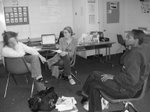Abstract Example - “Emphasizing Learning by Deemphasizing Grades”
This study, conducted at a high school in Chicago, IL, was to document the effects of student success after a change in grading change policies procedures to a more subjective and student-involved system. The formally used traditional grading system was replaced with one using rubrics on a self-assessment worksheet which students participated in developing. Students who received an A increased 25% from the prior year and 71% felt the new grading system helped them focus more on the learning than a grade and a majority felt it alternative affected their preparation and performance positively. Teachers reported that students seemed to be more genuine in their questioning rather argumentative over points or grades.
Ch 5 – Analysis and Interpretation
Analysis Techniques:
Identifying Themes – Consider the big picture and list themes that emerge. Patterns? Repeating events? Key phrases? Matching responses?
Coding Surveys, Interviews, and Questionnaires – the process of trying to find patterns and meaning in data collected through the use of surveys, interviews, and questionnaires. Transfer data to index cards to sort by categories or themes.
Asking Key Questions – Ask who what, where, when, why, and how, which ones?
Doing an Organizational Review – consider vision and mission, goals and objectives, structure of the organization, operation, problems, issues, and concerns.
Concept Mapping – Use a map to see major influences that have affected the study.
Anal sizing Antecedents and Consequences (causes and effects) – identify the major elements of t analysis; causes and effects
Displaying Findings – use audiovisual media to represent findings or other visual displays to see new aspects of your data.
Stating What’s Missing – identify what questions remain
Data Interpretation
Extend the Analysis – Raise questions about the study, noting implications that might be drawn without actually drawing them.
Connect Findings with personal Experience – share interpretations based on events and intimate knowledge and understandings of what is going on.
Seek Advice of “Critical” Friends – rely on trusted colleagues to offer insights that may have missed, but beware of the like=mindedness of colleagues and their responses.
Contextualize Findings in the Literature – uncover external sources as part of the review of literature and draw connects with external authority.
Turn to Theory – theory provides a way to link their work to broader issues and to search for increasing levels of abstraction.
Saturday, June 11, 2005
Subscribe to:
Comments (Atom)

